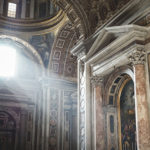For the last week, I’ve been listening the entire works of John Field. If you aren’t familiar with him, John Field is often considered the inventor of the Nocturne. And he was highly admired by composers of his time (including Chopin, who later popularized the Nocturne). With that, I want to present to you my top 7 favorite John Field Nocturnes.
Some of the links in this post are affiliate links. By clicking the link and purchasing the item, I receive a small commission. This is at no extra cost to you. Read my full affiliate disclosure for more information about affiliate links and why I use them.
Like with all music, this list is completely subjective. Everything here is my own opinion. You may have a vastly different list and reasoning for it. That is great! Discuss your views with everyone in the comments below (be respectful please!).
1.) Nocturne No. 1 in E Flat Major
This is, and probably always will be, my favorite John Field nocturne. Nocturne No. 1 was the very first piece I heard by Field and I immediately fell in love with it.
The left hand figuration is simple, but because of its gap of more than an octave creates the effect of multiple voices. Harmonically, it is quite simple. The tonic and dominant are the main focus (good for ear training!). The melody is simple and calming, consisting primarily of chord tones and passing tones. These are recurring devices in many of my favorite nocturnes. And they are prominent in most of Field’s early nocturnes (as we’ll see in a moment).
2.) Nocturne No. 5 in B Flat Major
In many ways, Nocturne No. 5 could serve as an extension of the previous entry. It has a similar left hand accompaniment, though with upward motion instead of downward. The melody follows the same chord tone/passing tone pattern as well and is just as beautiful. And as a bonus, it is even in the key of the No 1’s dominant: B flat major.
3.) Nocturne No.6 in F Major
Nocturne No. 6 is subtitled Cradle Song. Possibly based of an existing song? I’m unsure. Either way, I complete hear why it would have that subtitle.
This is the first on the list that transitions into the relative minor (D minor) instead of the dominant in the middle section. It’s so simple of a technique, but it is super effective here.
4.) Nocturne No.4 in A Major
Harmonically, I love this one. It’s very similar to the Romanesca schemata (particularly the bass movement), but there are some wonderful differences. (If you are not familiar with schematas, I recommend checking out Robert Gjerdingen’s Music in the Galant Style. Great book!).
The left hand figuration is also just a touch different. It no longer absolutely follows a rigid pattern. Instead, it adjusts slightly to the melodic notes. But it isn’t drastic enough to be super noticeable. It’s subtle, but it is so effective.
5.) Nocturne No.2 in C Minor
The first minor key entry on my list. It is compositionally very similar to Nocturne No. 1. Same left hand figuration. Same focus on chord tones in the melody. But there are a few difference. Most notably the minor key and the 3/4 time signature.
6.) Nocturne No.7 in A Major
Nocturne No. 7 is (in my opinion) where John Field starts experimenting much more with the recurring features I’ve mentioned in the previous pieces. This one is still fairly similar. It leaves out a few notes from the constant 8th notes in the left hand. The result is a softer and more peaceful sound.
7.) Nocturne No.9 in E Minor
While this one still has a most of the elements we’ve discussed in the other Nocturnes, there’s one thing that really stands out to me. The large octave gap has been removed. The entire piece feels a little more compact as a result. And I think it really adds to the somberness of the piece.
Final Thoughts on John Field Nocturnes
These are some of my absolutely favorite pieces for solo piece. Especially from a lesser known composer. If you are just now learning of John Field, I certainly hope you’ve enjoyed these Nocturnes as much as I have.
Do you agree with my ranking? Be sure to let us know your thoughts down in the comments.
If you are interested in performing any of these, be sure to grab the sheet music for all 18 of John Field’s Nocturne’s. I especially recommend this if you are interested in classical improvisation. There are some fantastic figurations throughout some of them.

